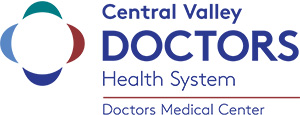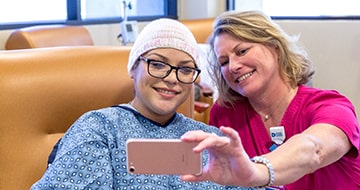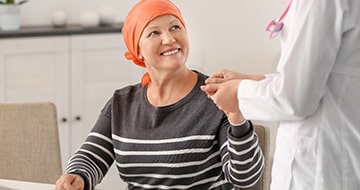Cancer clinical trials
Clinical trials are research studies in which researchers help physicians find ways to improve health and cancer care. Each study tries to answer specific cancer care questions and find better ways to diagnose or treat cancer. Doctors use them to learn whether a treatment is safe and effective for patients. Following are answers to some of the most frequently asked questions about clinical trials:
Should I take part in a clinical trial?
Only you can make the decision about whether or not to participate in a clinical trial. Before making your decision, you should understand your disease and the trials that are available to you. Ask your doctor or nurse how to locate a clinical trial that might be appropriate. Then discuss this information with your doctor, as well as family members and friends, to help you decide what is best for you.
Are there benefits?
There can be benefits in taking part in a clinical trial. If you take part in a study that compares treatments, you will receive either the best current treatment available for your cancer, or you will receive a new treatment that doctors hope will be better. Patients taking part in clinical trials can potentially benefit by receiving new medications or cancer therapies before they would otherwise be available.
What are the risks?
Even if a new treatment has benefits, it may not work for you. The new treatment being tested may not be better than the standard care treatment. You will not get to choose which of the treatments you will receive. As part of the study, you may have to have more frequent tests performed. But this does not mean that you will not receive excellent, compassionate care. In fact, most people enrolled in clinical trials appreciate the extra attention they get from their healthcare teams.
In clinical trials, who pays patient care costs?
Health plans and managed care providers do not always cover all the expenses associated with a study. It varies by plan and by study. Be sure to talk to your doctor, nurse or social worker from the study to help you determine in advance which costs are covered.
How are participants protected?
The government has a process in place to protect human research subjects. Before a government-funded clinical trial can begin, the trial plan (also called a protocol) must be approved. During the trial, review committees make sure the plan is being followed and that participants are being protected. Regulations require researchers to inform patients about a study’s treatments, tests and potential risks and benefits before a patient agrees to participate. This is called “informed consent.” To the extent that it is possible, your personal and medical information is kept confidential. Your name will not be used in any publication of study results.
How do I participate?
Each study has criteria to identify qualified participants. There are often specific criteria regarding your cancer stage, as well as other factors that will determine your eligibility. The research coordinator or physician will be able to review the criteria and your medical records to determine if you can participate.
For more information, contact the hospital’s oncology program coordinator at (209) 342-3415.
Genetic counseling and testing
Genetic counseling involves education about hereditary cancer and a detailed evaluation of your family’s medical history. Following your initial visit, you may decide to pursue genetic testing to clarify the level of cancer risk in your family. You may also learn that your family history does not suggest an inherited predisposition to cancer, and genetic testing is not necessary. You can still benefit from receiving education about cancer risk, as well as personalized screening and prevention guidelines.
Genetic testing is the process of using medical tests to look for changes — or mutations — in a person’s genes or chromosomes. The obvious benefit is a better understanding of your risk for a certain disease. Testing is not perfect, but it can help you make decisions about your health. A negative result on a genetic test in families at risk for a specific cancer may relieve uncertainty. A positive result can help you make important decisions about your future. It also may lead to finding disease earlier.
If you’ve already had cancer, you may learn about steps you can take to reduce the chance of another type of cancer. For example, a hereditary predisposition to breast cancer can be associated with an increased chance of ovarian cancer.
If you do have an increased chance of cancer based on your family history or genetic testing results, you have a variety of options. They include increased screening, medications that reduce the chance of cancer and risk-reducing surgery. There are also new methods of cancer detection and prevention that are being developed. Some of them are available through the Cancer Risk Program, as well as some clinical trials.
For more information, call (877) 946-3604.
Helpful resources
Doctors Medical Center offers occasional educational lectures on cancer prevention and early detection. All community members are welcome. The lectures focus on ways to prevent cancer and reduce your cancer risks.









